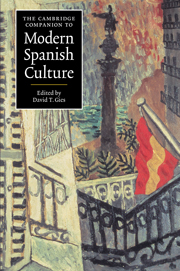14 - Poetry and culture, 1975-1996
from IV - Culture and poetry
Published online by Cambridge University Press: 28 May 2006
Summary
The twenty-odd years following the death of Franco - although they have seen the deaths of such central figures to poetic writing as Jorge Guillén, María Zambrano and, from another tradition, Gabriel Celaya - have been ones of extraordinary vitality for poetry. Developments have been particularly swift and multi-directional not just because of poetry's continuing ability to act as the prism for change through language and as the catalyst for intense new ways of participating in culture, but also because of a confluence of the following processes: the opening out of poetry to a wide range of cultural and theoretical perspectives from beyond the immediate Spanish contexts; the development of new poetic languages to express desire, sexual, and gendered identity; the publication of new works in new voices from earlier established poets (José Ángel Valente and Francisco Brines chief among them); an especially acute sensitivity to the creative possibilities offered by reworkings of poetic traditions in contexts of radical novelty; an increasingly sophisticated and enliveningly partisan apparatus of critics, prizes, and autonomous regional authorities needing to remake their cultures; a growth in prestigious and successful collections and poetry lists (in Madrid Adonais, Visor and Hiperión; Renacimiento in Seville; El Bardo and, lately, Tusquets in Barcelona); considerable numbers of collections and periodicals devoted to poetry, more than one thousand volumes of verse published a year, and an audience avid if not for poetry to read in print then certainly for poetry read out in performance and recital.
- Type
- Chapter
- Information
- The Cambridge Companion to Modern Spanish Culture , pp. 198 - 208Publisher: Cambridge University PressPrint publication year: 1999
- 1
- Cited by



